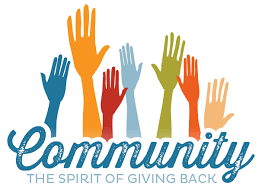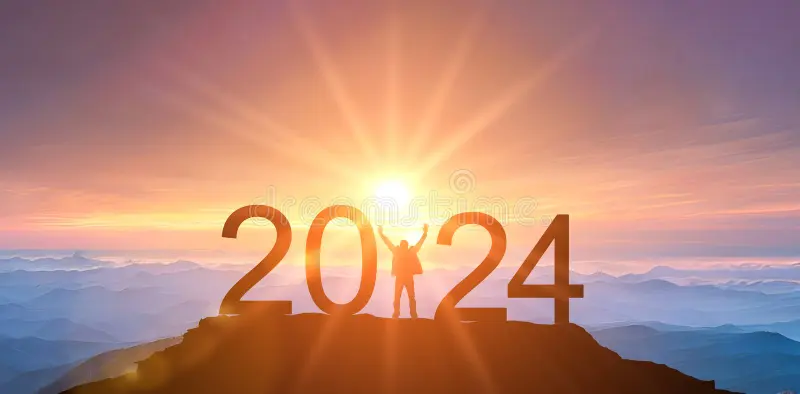 We stand ready to welcome the New Year 2024! But on what note shall be welcome it? Should we welcome it with a sense of entitlement to only get and to give back nothing? Should we usher 2024 with thoughts of entitlement or thoughts of gratitude? We clearly have a choice. However, will we exercise the right choice with sucha managha (illumined mind) or just think, speak, and act mindlessly?
We stand ready to welcome the New Year 2024! But on what note shall be welcome it? Should we welcome it with a sense of entitlement to only get and to give back nothing? Should we usher 2024 with thoughts of entitlement or thoughts of gratitude? We clearly have a choice. However, will we exercise the right choice with sucha managha (illumined mind) or just think, speak, and act mindlessly?
Unfortunately, in recent times the sense of entitlement runs high in our community. From a community of givers, we seem to be becoming a community of seekers and receivers. We seem to think that we deserve special privileges, from the cradle to the grave, and that our community institutions owe us everything in exchange for nothing! There is a palpable shift from ‘What can I do for my community institutions?’, to ‘what are my community institutions doing for me?’
There are several possible reasons why the community may have developed this negative narcissistic trait. Perhaps it is the environment one is raised in and from where one sees the world and what to expect from the world…
The most common weakness of all human beings and communities (as a body of human beings) is the habit of leaving their mind open to the negative or prejudicial influence of other people. It is a scientific theory that any impulse of thought which is repeatedly passed on to the subconscious mind of an individual or a community, is finally accepted and acted upon by the sub-conscious mind, which proceeds to translate that impulse into its physical equivalent, by the most practical procedure available.
When individuals or communities are injected with the first dose of negative or selfish thoughts, they either tend to ignore or abhor them. If they are injected with more of the dose for a time, they become accustomed to them and endure them. If there is a systematic method adopted for injecting repeated doses of negative and selfish thoughts for long periods of time, individuals and communities embrace them and become influenced by them.
Like people, communities are creators of their own fortune or misfortune, because of their positive or negative beliefs picked up by the sub-conscious mind and translated into its physical equivalent. The subconscious mind makes no distinction between constructive and destructive thought impulses. It works with the material we (or others) feed it, through thought impulses. The subconscious mind is known to translate into reality a thought driven by pessimism, just as readily as it will translate into reality a thought driven by optimism. Like the wind which carries one ship east and another ship west, the law of ‘positive affirmation’ and ‘negative suggestion’ will either lift you up or pull you down, according to the way you set your sails of thought.
How many of our community leaders today aspire to pool the energies of our community and focus it on making positive changes in the fabric of our society? Parsi politicians adopt policies of appeasement at the cost damaging institutions they are put in charge of. Over time, the community becomes accustomed to appeasement and harbouring a false sense of entitlement.
Echolalia is a condition in which a person goes on saying, repeatedly, something he has said or heard someone say. Among autistic children, it is a frequent disorder. But among some of our community leaders, it is a standard technique. The insinuation is put out by a few manipulators in the community and before you know it, the fabrication is shouted out all over the community and it comes to be taken for granted. Sometimes it is “religion in danger,” at other times it is “community properties in danger.” Truth is – most of the time, it’s only the position or seat of power that’s in danger, but religion or community institutions are projected as under imminent danger. We, as a community, must learn to beware of those who knowingly or unknowingly mislead.
Community’s Survival… Often, people ask me, “Will Parsis, as a community, survive beyond this century?” When not in the mood, I generally dismiss the question with the wise words of Dr. Albert Einstein, “I never think of the future. It comes soon enough.” However, at the bottom of my heart, I believe what the noted American preacher Henry W. Beecher said, “Every tomorrow has two handles. We can take hold of it with the handle of anxiety or the handle of faith.” Personally, I would choose to hold it with the handle of faith. Not blind faith. But faith based on past experiences and present resources.
Coping With Change… What are the facets of the community likely to undergo a change or likely to be threatened by change? Moreover, what are the facets where change is threatening our very survival? I would broadly identify four facets, which, in my opinion, are the building blocks of our community – Social and cultural; Economics; Ethical; and Identity. Let’s examine each of these facets and its impact on the ‘survival’ of the community.
- Social And Cultural:
Parsis have a remarkable ability to adapt themselves to the social and cultural environment of any geographical area they reside in. Ever since we left the shores of Iran in the wake of Arab persecution and arrived on the friendly shores of India, we have, as a community, been through several stages of social and cultural evolution. After our arrival in India, we gradually lost our hold over the sweet Persian language and adopted Gujarati. With the winds of Westernization, even Gujarati is gradually abandoned for English!
We also changed our food habits and dress. The ‘traditional’ sari is a dress our women adopted in India. Even the famous ‘dhansak’ is a cuisine we developed in India! Hence, despite undergoing centuries of social and cultural changes, Parsi – as a distinct and unique community, has survived. It is possible that over the next few decades, we will go through many other social and cultural changes, but they may not necessarily affect our survival.
- Economics:
Thankfully, the Zoroastrian religion has a very positive outlook about wealth and economic betterment. In fact, the religion looks upon poverty and want as manifestations of evil. Every Zoroastrian is encouraged to create wealth, provided it is generated through righteous means and used for righteous purposes. Charity should begin at home, but not just stay there.
Our ancestors bequeathed large properties (both movable and immovable) to the community in trust. It is essential that we learn to respect and not abuse these generous bequests. Just as “an army marches on its belly”, “a community marches on its brain.” One can hardly imagine a strong and dynamic community sans positive attitude, spirit of enterprise and economic prosperity. Fortunately, the resources available with the community are plenty. What we lack are able administrators for these resources. Instead of Professionals we have Politicians at the helm of governing our community institutions. Much of our future economic prosperity will depend on how we manage our cash resources and monetise our dead/ threatened assets.
What about individual excellence, one may ask? Our ancestors largely created their phenomenal wealth through trade. We were once leading in the police, army, air force and the navy. We once were leaders in the field of sports, cinema, and music. What happened? Where did we stop or change course?
My response would be, let us accept the change. If there has been a shift in career interests, let us accept the fact and strengthen it. Today, increasingly our youth is interested in modern creative fields of fashion designing, hotel management, catering, choreography, computer software, etc. As I see it, they are possibly as creative as our ancestors were in their time and age. So, what if we have a smaller number of our youth entering traditional fields of career. It does not matter what one does in life – the important thing is to constantly endeavour to give one’s best to achieve excellence. In the words of Oliver Goldsmith, “If I am a cobbler, the best cobbler I would be. If I am a tinker, no tinker can mend a kettle like me.”
Doubtlessly, the community will go through various economic changes over the decades to come. However, if the changes are handled with vision and understanding, they can be handled from a position of strength rather than weakness.
III. Ethical:
Parsis are known for their values of honesty, integrity, loyalty, and tolerance. They are even better known for their innate sense of humour and positive attitude to life. These are qualities we have in our genes. Agreed, there are a few dishonourable exceptions. However, by and large, our value system down the centuries has remained intact and hopefully likely to remain that way even in the future.
It’s important our youth understand what it means to be a Parsi Zoroastrian. It is no use saying, “I am proud to be a Zoroastrian” unless one really knows what one is proud about. Being a Zoroastrian is more than just talking about the religion of fighting over it. It means, and has always meant, living the message of Zarathushtra in everyday life.
- Identity:
As we have already seen, Parsis, after their arrival in India, went through several social and cultural changes. The language, clothes and diet changed, but there were certain ground rules that they strictly followed without compromise, which helped them retain their unique religious and ethnic identity. It is religion, which gives a community a well-defined code of living and regulates the community’s social life. It is again religion, which provides for a clear sense of identity and belongingness. It is this sense of belonging, which binds the members of a community together and ensures its survival.
Faith is a state of mind, which may be induced, or created, by affirmation or repeated suggestions – positive or negative. The trouble is we have filled our minds and spirits with only negative thoughts. We need to fill our minds with thoughts of giving, words of encouragement and deeds of upliftment.
If there is one resolution, we should make this New Year 2024 unitedly as a community, is to keep the demon of pessimism at bay. A French historian once asked Benjamin Franklin, “How long will the American Republic endure?” Benjamin replied, “Sir, it will endure as long as the principles and the ideals on which it is founded, shall remain dominant in the hearts of the people.” What applies to a nation, also applies to a community. When our forefathers landed on the shores of India, they brought nothing with them except a value system based on the traditions of their religion and a commitment to survive as an ethnic community, distinct from every other. We prospered and grew and, in our prosperity and growth, the nation also prospered and grew. The individuality remained intact. We gave freely of our wealth to the other communities, but never compromised on issues concerning our religion or traditions.
In 2024, let us forsake our false sense of entitlement and focus on enlightened thinking. Let us go back to asking what we can do for our community rather than ask what the community is doing or will do for us.
- Why Pray In A Language We Do Not Understand? - 29 March2025
- Celebrate Nature’s New Year With Purity And Piety of Ava - 22 March2025
- Celebrate Navruz 2025 With The Spirit Of Excellence And Wholesomeness - 15 March2025
